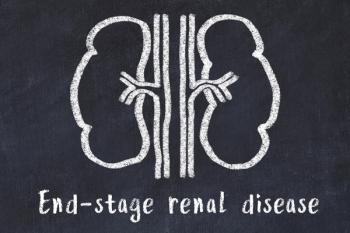
Court challenges on the independent dispute resolution process. A district court judge has vacated that part of the law nationwide.

Court challenges on the independent dispute resolution process. A district court judge has vacated that part of the law nationwide.

The toll that Alzheimer’s disease takes on the health of those affected by the disease is enormous. And so is the associated expense.

A recently published review delves into the role that type 2 inflammation plays chronic rhinosinusitis and the evidence that agents that interfere with that inflammatory pathway could be used as treatments.

Study adds to the evidence that reducing the risk of blood clots should be one of the main goals of managing these myeloproliferative disorders. Monitoring cholesterol levels may be especially important.

Chief Operating Officer of Hint Health, Mark Nolan, discussed direct contracting in healthcare among his organization with Managing Editor of Managed Healthcare Executive, Peter Wehrwein, in this week's episode of Tuning In to the C-Suite podcast.

The 30-minute documentary by a filmmaker with primary-progressive multiple sclerosis doesn’t settle for easy answers about the causes of the disease.

Results reported in the Journal of Clinical Oncology suggest filtering naïve T cells from peripheral blood stem cell transplants may decrease the risk of chronic graft-versus-host-disease. An accompanying editorial says a randomized trial is needed to provide definitive proof.

The 200-patient trial will test whether adding a monoclonal antibody called itolizumab to high doses of corticosteroids will improve outcomes for patients who develop acute graft-versus-host-disease after a stem cell transplant.

When managed care got started in the early ’80s, the focus was on physician and hospital services. Primary care doctors were positioned as gatekeepers, controlling referrals to specialists. Insurers came under a lot of criticism for shortening hospital stays. Now much of the managed care energy is trained on drug costs.

How successful accountable care organizations (ACOs) have been in bringing about value-based care hinges, of course, on how success is defined. CMS’ comprehensive end-stage renal disease (ESRD) care model is a good example.

Guidelines tell prescribers and patients to avoid switching among levothyroxine products from different manufacturers. But Mayo Clinc-led research finds little difference between switchers and nonswitchers.

Ideally, value-based and technology programs combine to produce better outcomes. But researchers at University of California, San Francisco, found little evidence of synergy in the meaningful use, patient-centered medical home and Medicare Shared Savings Program ACO program.

In discussing company’s drug spend report, CVS Caremark President Alan Lotvin, M.D., bats away criticism of the pharmacy benefits management (PBM) industry, blames drugmakers for high drug prices, and says independent pharmacies are doing well because of participation in “humongous buying groups.”

Main Line Health in suburban Philadelphia has solicited ideas for inventions from nurses. Barbara Wadsworth, the healthcare system’s chief operating officer with 35 years experience as a nurse, has invented a device for cushioning patient falls in the bathroom.

Recent treatment may affect the antibody response, particularly among those with hematologic cancers.

Findings from a randomized controlled trial reported in JAMA Internal Medicine today show that among short sleepers, adding sleep decreased calorie intake and led to some weight loss.


A Congressional Budget Office report documented the wide range in prices paid for hospital and physician services. Hospital inpatient services were the priciest in Massachusetts and cheapest in Arkansas

A Congressional Budget Office puts some numbers to the common knowledge that commercial payers pay providers significantly more than Medicare fee for service. The consequences include lower taxable wages and escalating federal subsidies of health insurance.

Robert Califf’s return to the top job at the FDA is in peril, reports Politico. But another news source predicts the Senate will eventually vote in favor of making him the FDA commissioner for a second time.

Humira may sink even further in the drug spend rankings next year when six biosimilars are expected to hit the market.

The CMS saw good news in its annual report on the federal healthcare agency’s largest ACO program. The National Association of ACOs say the report shows the program is shrinking and needs changes.

In this episode, Peter Wehrwein, managing editor of Managed Healthcare Executive, speaks with Dr. Rodrigo Cerda. Dr. Cerda has been recently promoted to the position of senior vice president of health services and chief medical officer of Independence Blue Cross in Philadelphia. He is also a member of Managed Healthcare Executive’s editorial advisory board. Peter and Dr. Cerda discuss his new role at the Independence Blue Cross, what it means to be a chief medical officer at an insurer these days, valued-based care, social determinants of health, and, of course, the pandemic.

Authors of an article in Health Affairs about a program for smaller and rural ACOs say their finding show those kinds of ACOs can generate major savings for Medicare, but apprehension about downside risk prompted an exodus from the program.

Our survey results reflect the reality that American healthcare is inching not galloping to value-based care.

Many of the darkest fears about COVID-19 affect on people with HIV have not come to pass. According to a recent review, some evidence suggests that people with HIV may be more likely to develop a severe case of COVID-19, although it isn’t certain. Antiretroviral therapy, especially Truvada, may provide some protection against infection and severity.

Almost two-third of the respondents to our survey were in favor of the trend of more state-level regulation of the pharmacy benefit management industry.

Cerdá, a member of the Managed Healthcare Executive® editorial advisory board, is part of a new wave of leadership at the Philadelphia-based insurer led by CEO George Deavens.

In a research letter published in JAMA Health Forum, researchers say most of the cost figures for Aduhelm have left out the additional MRI scans and other services that will be required because the drug is associated with the development of amyloid-related imaging abnormalities (ARIAs).

Hospitals in trouble, Moderna booster = 62.5% effectiveness, Supremes hear mandate arguments, get-used-it strategies the new COVID-19 normal, CDC soft pedals testing, and FDA OKs young teen booster